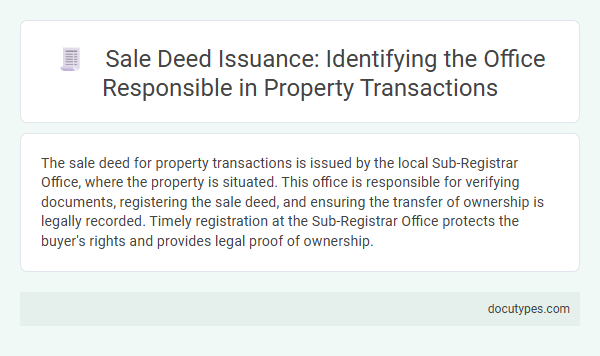The sale deed for property transactions is issued by the local Sub-Registrar Office, where the property is situated. This office is responsible for verifying documents, registering the sale deed, and ensuring the transfer of ownership is legally recorded. Timely registration at the Sub-Registrar Office protects the buyer's rights and provides legal proof of ownership.
Understanding Sale Deed Issuance in Property Transactions
In property transactions, the Sale Deed is issued by the local Sub-Registrar Office responsible for registering property documents. Understanding the role of this office ensures your property ownership is legally recognized and protected.
- Sub-Registrar Office - This government office officially records the Sale Deed, making the property transfer legally valid.
- Document Verification - The office verifies all necessary documents before issuing the Sale Deed to ensure authenticity and legal compliance.
- Registration Process - The Sale Deed is registered at the Sub-Registrar Office to create a public record of the new ownership, establishing your legal rights.
Importance of the Sale Deed in Real Estate Deals
The Sub-Registrar's Office issues the sale deed for property transactions, making it a vital authority in real estate deals. The sale deed serves as the official document that legally transfers ownership from the seller to the buyer.
- Legal Proof of Ownership - The sale deed is the primary evidence establishing your legal rights over the property.
- Protection Against Disputes - Registration of the sale deed prevents future ownership conflicts and fraud.
- Essential for Property Registration - The sale deed is mandatory for recording the transaction in government records to validate your property ownership.
Legal Framework Governing Sale Deed Issuance
The Sale Deed for property transactions is typically issued by the Sub-Registrar's Office under the jurisdiction where the property is located. This office functions according to the Indian Registration Act, 1908, which mandates the compulsory registration of sale deeds to ensure legal recognition and prevent disputes. Your transaction becomes legally binding only after the Sale Deed is officially registered and recorded by this authorized government office.
Key Authorities Involved in Property Sale Deed Processing
| Authority | Role in Sale Deed Processing |
|---|---|
| Sub-Registrar Office | The primary authority responsible for registering the sale deed. This office verifies documentation, facilitates the stamping process, and officially records the property transfer. |
| Stamp Duty Office | Ensures payment of the applicable stamp duty on the sale deed. Validates the authenticity of stamps used for the transaction. |
| Municipal or Local Development Authority | Provides necessary approvals confirming the property complies with local zoning and development regulations before the sale deed registration. |
| Revenue Department | Maintains land records and ownership details. Cross-verifies the ownership claims mentioned in the sale deed during the registration process. |
| Registrar | Appoints officials at the sub-registrar office who authenticate and sign the registered sale deed. Ensures legal compliance with property transaction laws. |
| Buyer and Seller | Provide required documents, identity proof, and complete the transaction formalities under guidelines issued by the authorities. |
Role of the Sub-Registrar Office in Sale Deed Issuance
The Sub-Registrar Office plays a crucial role in property transactions by issuing the sale deed, which legally records the transfer of ownership. This office ensures that the sale deed is properly registered and authenticated to protect the rights of both the buyer and seller.
All property sale deeds must be submitted to the Sub-Registrar Office located within the jurisdiction where the property is situated. The office verifies documents, collects applicable stamp duty and registration fees, and formally registers the transaction. This process creates a legal record, making the sale deed valid and enforceable under property laws.
Steps to Identify the Correct Issuing Office for Sale Deed
The sale deed for property transactions is issued by the Sub-Registrar's Office under the local jurisdiction where the property is situated. Identifying the correct office ensures the legal registration of the property transfer.
- Check Property Location - Determine the exact address or locality of the property to find the relevant Sub-Registrar's jurisdiction.
- Visit Local Government Website - Use official property registration portals to verify the Sub-Registrar office linked to the property's area.
- Contact Revenue Department - Consult the local revenue or municipal office for confirmation of the correct office responsible for issuing the sale deed.
Following these steps guarantees accurate selection of the issuing office for property sale deeds, facilitating a smooth transaction.
Regional Variations in Sale Deed Issuance Offices
The office responsible for issuing the sale deed in property transactions varies by region, often reflecting local administrative structures. In many states, the Sub-Registrar's Office handles the registration and issuance of sale deeds, ensuring legal validation. Some areas delegate this responsibility to municipal or revenue offices, highlighting the importance of understanding regional differences in property transaction procedures.
Required Documentation for Sale Deed Registration
The Sub-Registrar's Office is responsible for issuing the sale deed during property transactions. This office ensures that all legal formalities are duly completed for the transfer of ownership.
Required documentation for sale deed registration includes the original sale deed, previous title documents, and valid identity proof such as Aadhar card or passport. You must also submit the latest property tax receipt and a no-objection certificate if applicable.
Common Challenges in Sale Deed Issuance and Solutions
The Sale Deed for property transactions is issued by the Sub-Registrar's Office, which is responsible for registering property documents and ensuring legal ownership transfer. This office operates under the state's Registration Department, safeguarding the property rights of buyers and sellers.
Common challenges in Sale Deed issuance include discrepancies in property details, incomplete documentation, and delays due to backlog at the Sub-Registrar's Office. Verifying property records thoroughly and submitting all required documents can help resolve these issues promptly.
What Office Issues the Sale Deed for Property Transactions? Infographic

